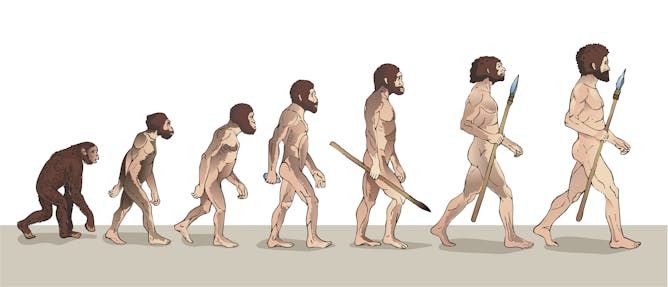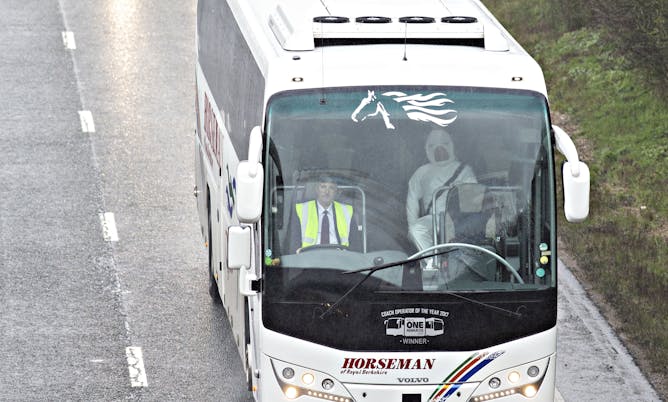|
|
|
Editor's note
|
|
One of the most famous scientific images you probably know is wrong. Or at least, the way most people interpret it is wrong. The famous “march of progress” that supposedly shows humanity’s apparent evolution from knuckle-dragging ape to upstanding master of the planet is not only an icon of science but has found its own life in countless memes that reinforce the idea that evolution of any kind is about constant improvement and growing complexity.
But in reality it doesn’t always work like that. Rather than constantly gaining novel genes that provide useful new features, organisms sometimes lose genes and develop a simpler form. Now research has revealed just how common this gene loss is. In fact, by working out how the genomes of many animals had changed over history, the researchers showed that several of the key animal groups, including those that encompass vertebrates, insects and
molluscs, there was evidence of gene loss on a massive scale.
This adds to the ample evidence that we should change our picture of evolution from one of constant progression and increasing complexity, to one in which lifeforms stand still, become simpler or go back and forth over time. Less of a march and more of a drunken stumble, as one researcher famously suggested.
Elsewhere on The Conversation, we look at the inherent problems of billionaires trying to solve climate change, and our coverage of the coronavirus outbreak continues as we consider how governments’ response could have some long-lasting implications for our human rights.
|
Stephen Harris
Commissioning + Science Editor
|

|
|
|
|

Usagi-P/Shutterstock
Jordi Paps, University of Bristol; Cristina Guijarro-Clarke, University of Essex
New research shows animal evolution often involves losing genes and becoming less complex.
|

Jeff Bezos wants to save the world – it’s been good to him, after all.
Michael Reynolds / EPA
Heather Alberro, Nottingham Trent University
Jeff Bezos $10 billion pledge is great, but is no match for a properly democratic transition.
|

A bus carrying British nationals from the city of Wuhan in China, leaves at RAF Brize Norton in Oxfordshire.
STR/EPA
Morgan Shimwell, Nottingham Trent University
It is now legal in England to isolate people against their wishes to prevent the spread of coronavirus.
|
Science + Technology
|
-
Mark Puttick, University of Bath
A mass extinction 66 million years ago killed the non-bird dinosaurs, but plants survived.
|
|
Health + Medicine
|
-
Richard Faragher, University of Brighton
The Health of Nations report outlines the UK's plans for extending the number of years people live in good health.
-
Nick Meader, University of York; Hollie Melton, University of York
Physical health conditions and socioeconomic disadvantage are both major reasons for this gap.
-
Dolly Sud, Aston University
Patients taking antipsychotics aren't being made aware of the risks or side-effects.
|
|
Environment + Energy
|
-
Simon Boxall, University of Southampton; Abiy S. Kebede, Brunel University London
Sandy beaches are densely populated and occupy more than one third of the global coastline.
-
Kathryn Fingland, Nottingham Trent University; Adam Blanchard, University of Nottingham; Rachael Tarlinton, University of Nottingham
Scientists hope to learn what makes certain red squirrels able to survive squirrelpox.
|
|
Business + Economy
|
-
Donald Hirsch, Loughborough University
All eggs in supermarket Morrisons will soon be free range. But this – and other measures intended to promote ethical consumption – could impact badly on the worst off.
|
|
Arts + Culture
|
-
Marc Longenecker, Wesleyan University
Invisibility has been used to indulge fantasies of good and evil, level social critiques or warn of the dangers of power in the wrong hands.
|
|
|
|
| |
Featured events
|

|
Room SLB/118, Spring Lane Building, Campus West, York, York, YO10 5DD, United Kingdom of Great Britain and Northern Ireland — University of York
|

|
Lecture Theatre 1, Richmond Building, Portland Street, Portsmouth, Hampshire, PO1 3DE, United Kingdom of Great Britain and Northern Ireland — University of Portsmouth
|

|
DoubleTree by Hilton Hotel Southampton, Bracken Place, Chilworth, Southampton, Hampshire, SO16 3RB, United Kingdom of Great Britain and Northern Ireland — University of Portsmouth
|

|
East Road, Cambridge, Cambridgeshire, CB11PT, United Kingdom of Great Britain and Northern Ireland — Anglia Ruskin University
|
|
|
|
| |
| |
| |
| |
| |
|
|
|
|
|
|
|